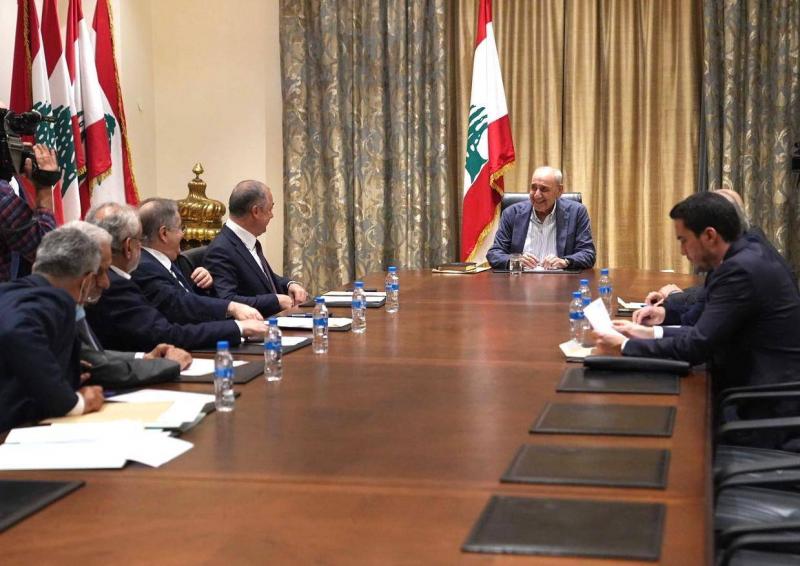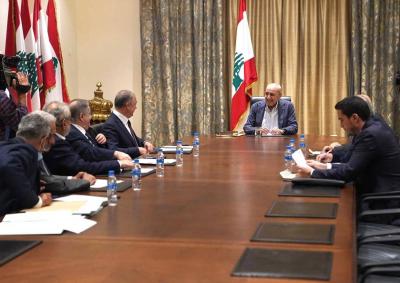The President of the House of Representatives, Nabih Berri, chaired a meeting for the Bureau of the House of Representatives at the second presidential office in Ain al-Tineh, attended by Deputy Speaker Elias Bou Saab, the secretaries of the two deputies, Hadi Abu al-Hasan and Alan Aoun, and the delegated deputies: Michel Moussa, Karim Kabara, and Hagop Boghosian, as well as the Secretary General of the Parliament, Adnan Daher. After the meeting, Bou Saab spoke to the media, saying:
"The Bureau of the House of Representatives held a meeting presided over by Nabih Berri, and the discussion included proposed laws to be presented to the general assembly, specifically: First: The urgent repeated law aimed at extending the terms of existing municipal and elective councils until a date no later than 31/5/2025, proposed by Deputy Jihad al-Samad. Second: An urgent repeated law proposal to determine the applicable law for volunteers confirmed in the civil defense."
Boushab noted that discussions were held regarding these two laws, with a focus on limiting the general session to them. He also mentioned the recent extension, stating that the law previously discussed a maximum duration, and now the law also talks about a maximum duration. The President has decided to schedule a session for the general assembly on Thursday, April 25, 2024, in the Parliament, with the final decision resting with the general assembly.
There was a discussion about the possibility of holding municipal and elective elections starting in regions where elections can take place while awaiting developments in other regions, with differing viewpoints presented. However, as he mentioned, the matter is left to the general assembly.
In response to a question about some parliamentary blocs' rejection of the extension for municipal councils and the possibility of delaying elections in the south until the war is over, Bou Saab said: "Now I respond in my personal capacity; some blocs have differing viewpoints, and we as deputies also have differing views. Personally, I believe we should start where we can conduct elections. There’s another viewpoint that states we are in a state of war, and the enemy does not spare any areas in the south and the Bekaa, which also creates complications. For example, the municipalities where elections will be held in four or five months, what is their term duration? This implies the need for amendments."
He added, "There’s something we must state frankly regarding the country’s situation and the tensions we hear related to sectarianism and confessionalism. There is also a significant issue concerning the election of the municipal council of the capital, Beirut, in the current situation, and we should not take this lightly. However, this does not mean we shouldn’t hold municipal elections, but we must find a solution and a remedy for it, which must be through political consensus, as it’s essential to consider the municipality of Beirut."
In response to whether limiting the agenda to two items was agreed upon with political blocs, he replied: "We did not talk to parties or groups. The agenda includes two items, and Nabih Berri spoke only about these two proposed items. There was no request from anyone regarding the agenda. However, I personally requested that there are certain laws important to citizens, including educational and health matters. I had previously proposed them here, and there were criticisms of my statements that if this council is unable to elect a president, then we need to think about early parliamentary elections. Why did I say this? Because legislative paralysis costs the citizens."
He continued: "We in the general assembly are going to discuss the law extending the terms of all municipal and elective councils." Regarding the financial capacities for conducting municipal and parliamentary elections on time, he said: "I communicated with the Minister of Interior, who confirmed that funding is available and ready for the elections. When I asked him about the number of individuals who have submitted their nominations, he said: Until now, there have been no applications, and thus this matter is with the Ministry of Interior and the government."
On why a law to conduct municipal elections instead of extending them has not been presented, Bou Saab elaborated: "This does not require a proposal to conduct elections in one area and not another. The current law is a reality, and I had proposed a technical extension for a period of only three months. At that time, all administrative offices were closed, and no one had applied to run for election. Therefore, I said it was a technical extension. At that time, the President intervened by saying it remains a maximum period. This means the government could have conducted the elections after a month or two. So the question is, why were elections not conducted then? The government should answer this."




